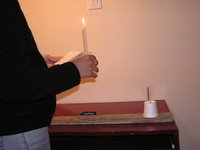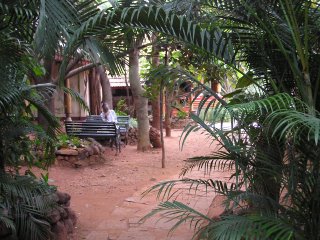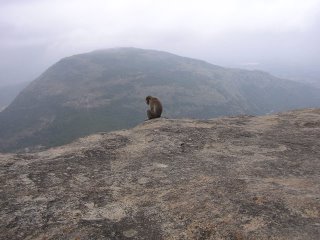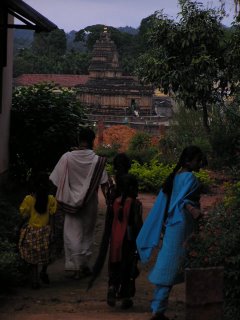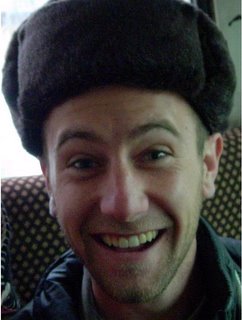Topstation-- trekking
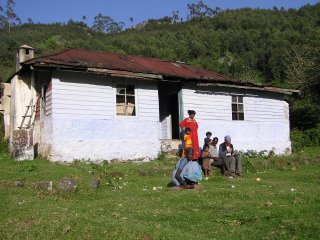 This is a picture from Topstation of the home of our guide, Mano, with him and his family (and Christoph) out front. I should clarify that Topstation isn't so much a town as a pretty place to visit, with I'm guessing something like ten or fifteen families living there, presumably supported primarily by tourist visits from Munnar. The photo was taken last chronologically amongst those included here, but this place was the starting point of our time with Mano, so I've put it first. We showed up at Topstation in the afternoon despite best made plans to make it in the morning, so that day all we did was check out the area around Topstation a bit. I had seen it previously, but it was a bit clearer this time, and the place is really just spectacular.
This is a picture from Topstation of the home of our guide, Mano, with him and his family (and Christoph) out front. I should clarify that Topstation isn't so much a town as a pretty place to visit, with I'm guessing something like ten or fifteen families living there, presumably supported primarily by tourist visits from Munnar. The photo was taken last chronologically amongst those included here, but this place was the starting point of our time with Mano, so I've put it first. We showed up at Topstation in the afternoon despite best made plans to make it in the morning, so that day all we did was check out the area around Topstation a bit. I had seen it previously, but it was a bit clearer this time, and the place is really just spectacular.We had dropped our bags in Mano's house, and as the light began to fade we returned there. Part of the deal was that he would feed us, so shortly afterwards, as we sat beside the fireplace in the room Mano keeps for his customers (or so he says), he brought us some excellent rice and eggs someone in the family had prepared (probably his wife's mother, who lives with them, as his wife was in a nearby town for the evening for some reason). The house had no electricity-- though the church just next to where I stood to take the picture does. So they have no lighting, but they do have a battery operated radio. It's cold up there, and only some of the windows are still there, so the house is cold-- but none of them seem to care much. Mano's little son Katic was running around in just a t-shirt (as in no pants) the whole time. (All the empty windows you see in the picture are misleading-- there's sort of a porch space in the front of the house. In other words, they're not all broken.)
----So much for half an hour. That's as much as I wrote in that attempt (several days ago); hopefully I can finish this today . . . All this is starting to feel so long ago; forgive me if I am writing mechanically. ----
Anyhow in the morning after some breakfast we packed up what we needed for the day and headed off. The morning was spent with Mano leading us down all sorts of little paths running through the area's tea plantations. That's what you can see in
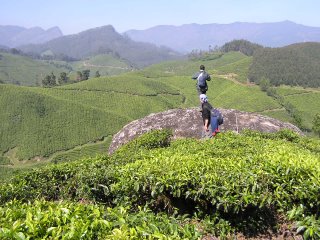 the picture here. The green hills in the middle distance are covered in the tea plants you can see in the foreground. It was really quite beautiful. Throughout the walk Mano would pick a few leaves from plants we passed and explain their traditional use. I especially appreciated the remedy for clogged sinuses, as I had come down with my first cold of the trip the day before. When he wasn't talking about plants he was talking about . . . something. Mano is one of the most prolific talkers I have ever encountered in my life. The most incredible thing is that the man must know barely a hundred words of English, but world class persistence and loads of gesturing made it such that he was able to communicate quite a bit to us, though there were also certainly plenty of times where I was just nodding my head wondering what he could possibly be talking about. A favorite topic was animal encounters. He had a few tiger stories, though none that ended badly (and we saw tiger cub tracks!), and endless tales of destruction and death inflicted by elephants. The place where his father escaped from a raging elephant decades earlier, the place where an elephant gored a young man from a nearby village with its tusk, the spot where thee used to be the "grass house" of an "unlucky family" until an elephant decided to trample the whole thing in the night sometime last year. In everything we learned of the way of life in these mountain communities, the menace imposed by wild elephants seemed among one of the most difficult aspects of existence. Of course elephant rampages make for good stories, so my perception may well be skewed.
the picture here. The green hills in the middle distance are covered in the tea plants you can see in the foreground. It was really quite beautiful. Throughout the walk Mano would pick a few leaves from plants we passed and explain their traditional use. I especially appreciated the remedy for clogged sinuses, as I had come down with my first cold of the trip the day before. When he wasn't talking about plants he was talking about . . . something. Mano is one of the most prolific talkers I have ever encountered in my life. The most incredible thing is that the man must know barely a hundred words of English, but world class persistence and loads of gesturing made it such that he was able to communicate quite a bit to us, though there were also certainly plenty of times where I was just nodding my head wondering what he could possibly be talking about. A favorite topic was animal encounters. He had a few tiger stories, though none that ended badly (and we saw tiger cub tracks!), and endless tales of destruction and death inflicted by elephants. The place where his father escaped from a raging elephant decades earlier, the place where an elephant gored a young man from a nearby village with its tusk, the spot where thee used to be the "grass house" of an "unlucky family" until an elephant decided to trample the whole thing in the night sometime last year. In everything we learned of the way of life in these mountain communities, the menace imposed by wild elephants seemed among one of the most difficult aspects of existence. Of course elephant rampages make for good stories, so my perception may well be skewed.In the mid-day we stopped to take our lunch (which we'd carried from Topstation, packed for us by Mano in a banana leaf and newspaper) at a small village. What Mano apparently hadn't fully succeeded in communicating to us was that we were waiting for a ceremonial procession to pass by. We knew we were going to see some dancing in a village in the area, but it was quite a
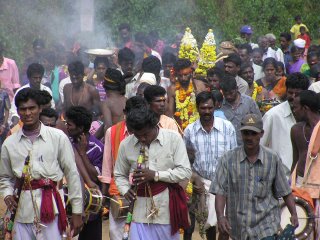 surprise when several hundred people-- many dressed in bright ceremonial garb (such as the floral cone shaped hats you can see in the picture)-- rounded the bend down the road, and the music we had heard in the distance was suddenly upon us. After those with important roles in the ceremony had passed by we joined everyone, who we found out were walking towards a nearby Hindu temple. Soon after our joining we were hit with another surprise when a young girl approached me and began speaking to me in perfect English (complete with a vaguely British accent). It turned out that her mother, who was walking next to her (but didn't speak English), was the mayor-equivalent of the region. They were Christian, and it seemed that they were attending the (Hindu) ceremony at least in part due to her holding this position-- the making an appearance sort of thing. The girl, who turned out to be fifteen though she looked younger and acted older, was great to talk to-- full of energy, very positive, well educated and informed.
surprise when several hundred people-- many dressed in bright ceremonial garb (such as the floral cone shaped hats you can see in the picture)-- rounded the bend down the road, and the music we had heard in the distance was suddenly upon us. After those with important roles in the ceremony had passed by we joined everyone, who we found out were walking towards a nearby Hindu temple. Soon after our joining we were hit with another surprise when a young girl approached me and began speaking to me in perfect English (complete with a vaguely British accent). It turned out that her mother, who was walking next to her (but didn't speak English), was the mayor-equivalent of the region. They were Christian, and it seemed that they were attending the (Hindu) ceremony at least in part due to her holding this position-- the making an appearance sort of thing. The girl, who turned out to be fifteen though she looked younger and acted older, was great to talk to-- full of energy, very positive, well educated and informed.One thing she mentioned that I found interesting was that though her mother had run-- and lost by a margin of a dozen or so votes-- in the election prior to the one before that in which she won (i.e. 2 elections prior to that which she won), her father had run in the election in between-- and also lost by a tiny margin. So they acted as a sort of political team. Though by and large it seems that women in Indian culture are not looked on as equal to men, this is only one of several things I've learned about that suggests that in politics they are-- at least much more so than in the US. [The most obvious example of this is Indira Gandhi, who was PM for the better part of the mid-sixties to mid-eighties (when she was assassinated). Also interesting to me is that what I know of her career seems to me to parallel what I know of that of Margaret Thatcher: quite a bit of heavy handed union busting and the like. I suppose I need to not include this sort of thing anymore if I want to finish this entry . . . ] Anyhow, she had won in the recent election by a large margin. They were the candidates of the Congress party (said to be moderate; that of Mrs. Gandhi and her father Nehru, one of the main Indian independence figures), and so they felt that this victory was a big deal, as Congress has had only limited success in the state of Kerala.
The reason for this, and one of the things that makes travel in Kerala interesting, is that Kerala has tended to be rather left-leaning. It's state government happens to be the only democratically elected Communist government . . . ever, according to Keralans, anyhow. I certainly don't know of another example. And while I talked to a number of people with gripes about leftist policies creating problems for business and preventing investment in the state, many people seem to be absolutely thrilled with their leftist government-- and understandably so. Kerala's literacy rate is insanely high-- over 90%, in a country with a national average estimated at about 65%. Those I spoke with attributed this to the heavy emphasis on education by the state govt. During our trek we saw several examples of the government involved in the life of the rural poor-- the house we slept in on the second night had had a grass roof only a year or two earlier, but the family had been able to install metal roofing thanks to grants from the govt. Several homes had (limited) electricity due to grants for solar panels.
Back to stuff that happened (I'm hopeless!), the procession ended not too long after we joined them at a smallish Hindu temple, where some hired dancers-- two men and two women-- performed a series of dances. They were quite entertaining, especially a bit of mock husband-wife bickering worked into the performance. There was quite a bit of pressure for us white boys to join in with the dancers but we managed to avoid what would have been certain humiliation. Apparently the ceremony was to continue into the night, and there was to be a goat sacrifice around midnight, but after taking it in for a bit we continued on our way.
After only a bit more walking we arrived in the tiny village where Mano's wife's family lived, where we spent the night. Memorable bits of the stay included being forced to drink an entire glass of this powder that was supposed to cure my cold mixed into a homemade alcohol that was, to me at least, indistinguishable from vodka.
It was absolutely vile. It also didn't cure my cold, though after Mano's insistence on our drinking more throughout the evening I did wake up the next morning with a hangover. Also interesting was the sleeping arrangement-- Mano, Christoph, and myself all packed together like three big sardines in sleeping bags and blankets on the floor of this little room. We had discovered the night before that Mano was a world-class snorer, but as he had been in the next room it hadn't been a big problem. This night, as soon as Mano's drunken hiccuping ceased, he started straight away into impossibly loud snoring-- sleeping was absolutely impossible. As Christoph was in the middle I told him to give Mano a shove so that he would shift about and hopefully stop snoring. Christoph didn't want to, so I reached over and poked him lightly in the ribs-- no reaction, no change. I poked harder-- still nothing. My attempts escalated further and further, and yet the snoring went on. It wasn't until I started kicking him that he rolled over-- still not waking-- and the snoring ceased long enough to fall asleep.
The next day we hiked to the nearby tribal village. The village didn't look entirely different from others in the area, but it was set in a beautiful spot in a gorgeous valley. According to Mano the people spoke their own language (certainly not Tamil, as that's what he speaks), and he was only allowed to visit and bring us because his wife was friends with some of them on account of growing up nearby. When the children playing saw us approach, they all ran and hid-- these people definitely weren't used to seeing Westerners. One of the great things about this whole trip was that it seemed that no Westerners ever went to any of these places, besides
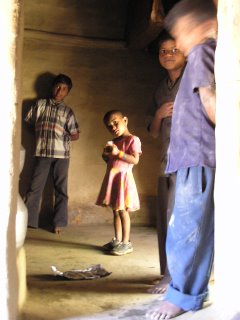 those of us who came with Mano. We didn't stay long-- all we really did was stop in for tea at the home of one family he knew. The picture was taken inside the home. There were several generations of people inside, moving about doing different things. The kids--some of whom are in the picture-- were curious and cute but very shy. I really loved this village-- I instantly decided I wanted to learn their language and come back and stay for half a decade. (I also gave up this idea pretty quickly-- besides the facts that there's no way to arrange it and they probably wouldn't let me anyhow, I don't see what benefits my presence could benefit them and their apparent attempt to preserve their apparently distinct culture.)
those of us who came with Mano. We didn't stay long-- all we really did was stop in for tea at the home of one family he knew. The picture was taken inside the home. There were several generations of people inside, moving about doing different things. The kids--some of whom are in the picture-- were curious and cute but very shy. I really loved this village-- I instantly decided I wanted to learn their language and come back and stay for half a decade. (I also gave up this idea pretty quickly-- besides the facts that there's no way to arrange it and they probably wouldn't let me anyhow, I don't see what benefits my presence could benefit them and their apparent attempt to preserve their apparently distinct culture.)Anyhow, that's enough about the trek. We stopped at the home of the mayor for a bit for some fruit, as they invited us to come the day before. Then we hiked back. That afternoon we arrived back in Topstation, and that night we caught a bus all the way back down to the coast.
At this point we were both sick, and both "irregular", and had a bit of a misadventure when it turned out that every single hotel in the town of our arrival was booked. In the end our best option proved to be catching a 3:30am train to our next destination, a town in the north of Kerala called Kannur. Kannur was to be a brief stay, but ended up several days longer than expected on account of the inability to get a train reservation. So this was where we ended up for New Years. We went to witness a supposedly wild, all night long religious ritual particular to the region (called Theyyam) for New Years, but it was kind of a bust. Se la vie.
Happenings for 2006 forthcoming . . .
--Josh

